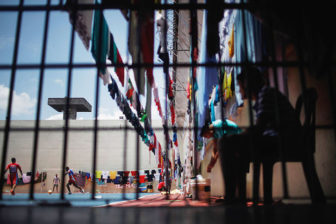Leer en español | This piece has been updated.
I was practically a kid, 22 years old, when I moved to Argentina in 2000 with the crazy idea of making it as a reporter. Shockingly, the Buenos Aires Herald was in no rush to hire a Texan with no experience, and the economy seemed to be in a bit of trouble. I knew only two Argentines – both lovely, but older, with kids and lives of their own. So I spent sweltering days wandering the streets and riding the #60 bus (it crossed the whole city from Constitución to Tigre for under a dollar, and offered a nice breeze) while devouring empanadas, ñoquis and ham sandwiches on a budget of 70 pesos – which then was 70 dollars – per week.
Weekends were most desolate of all. I read Borges, Arlt and Mafalda. I binge-watched the Weather Channel in Spanish, and memorized the lyrics to a Rodrigo song. Finally, after watching the inauguration of Uruguayan President Julio María Sanguinetti on TV from start to finish, I decided I either needed to get a life or go home.
Two things ended up saving me. The first, though a total cliché, was tango lessons – which turned into a nice hobby and, years later, into a book. The second, far more important, was a group of a dozen Argentine guys from Temperley, an old railway suburb of Buenos Aires, whom I met through a common friend back home. They had known each other since high school; they spent weekends playing tennis, making asados and going to 1980s-themed nightclubs until 5 a.m.; they gave each other ridiculous nicknames like Wallet, Wolfman and Boti. They took me in, for reasons I still don’t quite understand, and baptized me “Caruso” – after an Argentine child actor of that era, the only other “Brian” they knew.
I had my own crew back home, but I quickly discovered the Argentine talent for life-long group friendships was in a class of its own. These guys did everything together. They had decade-old running jokes – one guy was always “getting married next spring” – and indecipherable slang. They were also open about their struggles, sometimes shockingly so – girlfriend trouble, job losses and family squabbles were dissected with both humor and subtle compassion. They vacationed together: Villa Gesell, Bariloche, the glaciers. I tagged along several times, awed by the strength of their bonds, convinced – correctly, as it turned out – that this group would stay together over the years, even after marriage, kids and careers began to take root.
I thought of those guys last night, in the wake of the terrible terrorist attack in New York City, where I now reside. Among the eight fatalities were five Argentine men, high school friends on a group trip to celebrate the 30th anniversary of their graduation – exactly the sort of thing my Temperley crew would have done. When I saw the photo of them (above) gathered at the Rosario airport, wearing T-shirts that said “FREE,” I instantly understood what this trip meant to them. Sure, they were “free” for a weekend from the middle-aged pressures of jobs and family, but I reckon that was secondary. Above all, this was an opportunity to maintain those bonds, to re-up on those three-decade-old jokes, and laugh until 5 a.m.
According to Argentine press reports, Ariel Erlij, 48, had a successful career as a steel executive in Rosario, where the group had studied. He helped pay for his friends’ tickets – no small thing in a country just emerging from a nasty recession. They landed in New York, then made a quick side trip to Boston, where another member of the group now lives. Upon returning to the Big Apple yesterday, they decided to go on a bike ride in Lower Manhattan. Erlij and four others – Hernán Diego Mendoza, Diego Enrique Angelini, Alejandro Damián Pagnucco and Hernán Ferruchi – lost their lives. One of the survivors’ wives told La Nación: “They’d been waiting for this trip for so long. I can’t believe it ended this way.”
I have lived in other Latin American countries in the years since, and social bonds are tight there, too. But – I insist – there’s something special about Argentina. So much else has gone wrong over the years: the brutal dictatorship of the 1970s, the hyperinflation of the 1980s, and the devastating 2001-02 economic crisis, which I experienced firsthand (and eventually covered in my first reporting job). Why hasn’t everybody just abandoned the country? Well, many did. But those Argentines who remained will almost universally tell you it was because of those bonds – family, yes, but also their crew from high school or college. The national talent for lifelong camaraderie is surely Argentina at its very best. To see it now at the epicenter of an international tragedy, in the city where I live – I’m so sorry. It just breaks my heart.
A previous version of this article misstated the location of the airport in which the photo was taken.









